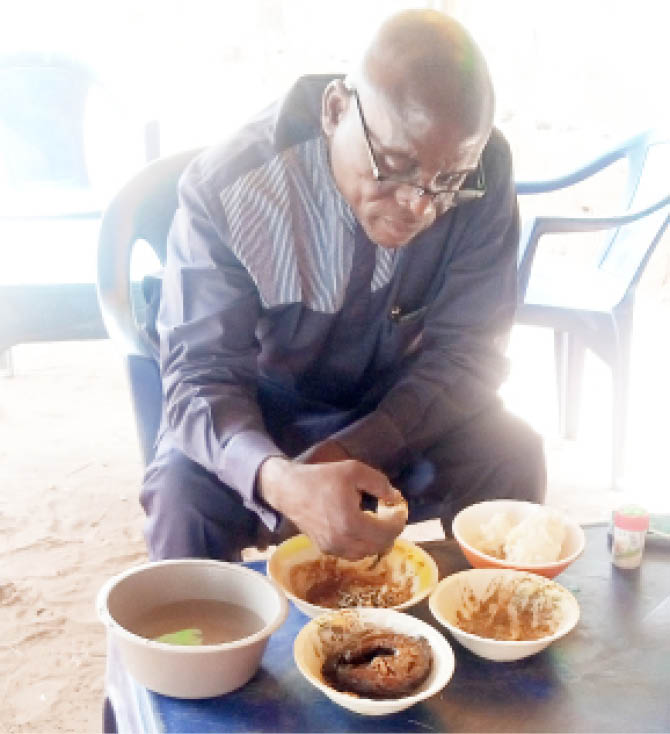In Benue, it is unthinkable to eat one bowl of soup with no less than four plates of different soup. Our correspondent looks into this unusual eating etiquette among the Tiv people.
On licence plates and jingles, Benue State announces itself with some hubris as the “food basket of the nation,” and prides itself on its 120 agricultural produces and a nearly 90 per cent farming population spread across 23 local government areas.
Crop or livestock farm, every family has one, no matter how small. There is so much food in Benue that a first-time visitor would attest to the different mouth-watering delicacies served in various restaurants or eateries.
But, a surprising reality awaits those who transverse the Tiv speaking areas where it is common to be served with at least four varieties of soups for a bowl of hot pounded yam garnished with assorted meats.
The practice is not only observed in the local restaurants but even in homes of typical indigenes of the land. The delicacies are usually the delight of the people who make their choices of soups, stick to one or consume all of them at the same time.

The soups range between pocho, okro, ogbono, egusi, or vegetable among other soups indigenous to the Tiv people.
Caroline Penda, who operates a roadside bukka under a tree near the Government House in Makurdi, said she sometimes serves her customers with more than four plates of soups for one bowl of pounded yam or other ‘swallows.’
Penda said, “I don’t charge customers for the extra plates of soup. The customers come here and demand different soups; some of them like different types of soup while others want at least two different soups.
“The customers mostly prefer traditional soups so I serve them with what they want to eat. We sell our food very cheap and for a bowl of pounded yam, there could be five other soups in small quantities to accompany the dish. It’s only vegetable soup that attracts additional charge here.”
In the nine Tiv speaking local government areas of the state, our correspondent gathered that the practice is the same—at least four plates of soup for one plate of pounded yam, fufu or any swallow of their choice.
The fufu is a smooth mixture of fermented cassava or pounded yam and flour – smoothly ground dried yam, cassava or corn cooked in hot.
At Fransisca Nyinya’s place under a large tree in a make-shift tent in Makurdi, customers are spotted munching their meals of several soups with pounded yam or fufu dishes.
Nyinya explained that “people like different kinds of soups and that’s why I prepare them in various pots. I have locust bean (nune), ewedu, beniseed, okro, egusi and dried okro soups among others.
“I don’t charge for the various soups. A plate of pounded yam is N200 here; the customers then pick their meat of choice, whose prices range between N100 and N500, then the dish is paired with four or more soups for their delight.”
One of the customers, Tondo Francis, said he was born into the culture of savouring a bowl of pounded yam with four or more soups.
“Today, I just finished eating three plates of soups with my two wraps of pounded yam. Other places where people stick to one soup is because they don’t have plenty of food.
“I enjoy eating different soups at a go. I learnt it from my father who taught me to follow suit. I just finished three soups now – beniseed, vambe and atiever. Even at home, my wife serves me the same way,” Francis added.
Even in urban centres like Makurdi and Gboko where non-indigenes are resident in their large number, this practice has subsisted.
Some traditionists believed the idea of multiple soups paired with a bowl of pounded yam started in Gboko. This could not be independently ascertained.
The Chief Executive Officer (CEO) of Awatortun’s Kitchens, Hembadoon Aule, who has been rendering hospitality services for over two decades and had since upgraded to serving multiple soups said the idea was to put customers first because that is what they want.
“We serve at least four soups per meal, depending on what a customer wants,” Aule said.
She added, “Once you buy meat, you don’t have to pay for soup; it is the Igbo people who sell soup. We don’t sell soup.”
She listed some of the native soups served at her place to include, “Vambe, atiever, ashwe (both leaves and pods), Pocho (either Pocho only or with fish), Egusi (Chegher) in bitter leaf and pumpkin (ugwu), beniseed with fish, beniseed with chicken, adenger with egusi and Fulum with egusi.”
She further disclosed that her 12 workers operate three different spots in Makurdi and make supplies to outdoor customers based on their orders.
“Multiple soups usually attracts more customers and that’s why we continue to render the service here. I’m a local woman who learnt the art of cooking from my mum. I cooked for my husband who attested that I have great culinary skills and that’s why I have engaged in cooking over the years as a business,” Aule explained.
On her part, Emmanuella Nguevese Emberga who runs Ellamore Cuisine said that she had been serving more than four soups per plate of food to her customers since entering the business in 1999.
“We don’t sell soup; only the meat. The multiple soups help us in selling our food because people come for the variety of soups. It would be difficult to retain our customers with only one type of soup,” Emberga said.
A consumer who relished the different soups paired with pounded yam, Denen Achussah, who is a journalist resident in Makurdi was spotted at Awatortun’s kitchen savouring his lunch.
“I love local soups. Ashwe (the peppered leaves), igande atuur, dry fish with pocho, furum with egusi and adenger with egusi and dry fish,” he said.
He added that what attracts him most to the stylish serving of food at such restaurants was the affordability and good taste.
Similarly, Titus Aniho, said, “I like different soups to go with my meal of pounded yam. It’s variety that makes up the spice of life. And it is better to eat that way.
“I was born into the culture and will continue to embrace it. I will even promote it among people who don’t know about it.”
While another lover of local delicacies, Iveren Kwarkar, a Media Director with the Association of Tiv Actors (ATA), spotted at Ellamore Cuisine, enjoying her pounded yam paired with three or more soups, simply said the meal was just satisfying in the unique way it was served.
“It allows you the opportunity to select from the lot that is provided. If you don’t like one or one does not taste to your satisfaction, you can switch to another,” Kwarkar said.
For the Principal Special Assistant (PSA) to the Benue State Governor on Culture and Tourism, Tahav Agerzua, expressed optimism that the state government would do everything to preserve and promote the culture for the betterment of the Tiv peoples’ culture.
“It’s part of Tiv culture to serve pounded yam with several soups, especially to a visitor. One of the soups is usually meat while the others could be seasonal vegetables or what the host may consider the best cuisine of the family.
“Most plans for festivals are now on hold as a result of the Covid-19 pandemic which scuttled so many festivals last December. But when the challenge is overcome a food festival is imperative.
“However, Benue participated at the traditional cuisine of the National Festival of Arts and Culture in Jos last November and took fourth position indicating readiness and experience for a food festival,” Agerzua said.

 Join Daily Trust WhatsApp Community For Quick Access To News and Happenings Around You.
Join Daily Trust WhatsApp Community For Quick Access To News and Happenings Around You.


